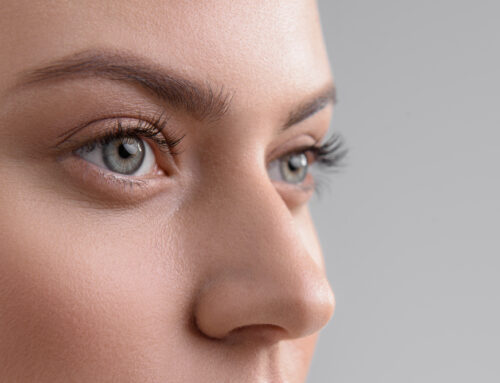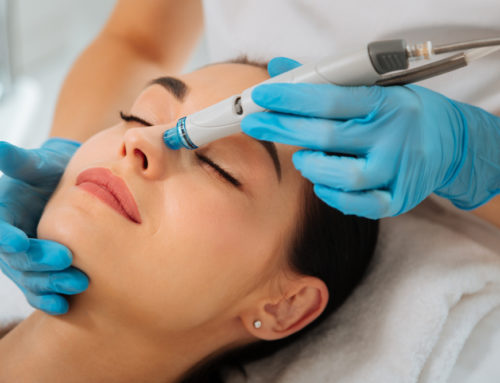Most people know a good skin care routine is necessary for youthful, glowing, blemish-free skin. But you might not realize that taking care of your skin is vital in safeguarding your overall well-being and projecting your internal health.
As the largest organ in the body, caring for your skin through a nourishing and personally tailored skin care routine is not just about beauty and appearance; it is a vital aspect of maintaining good health.
As we celebrate Healthy Aging Month this September, we thought we would share the significance of a proper skin care routine not only for a radiant appearance but because of the skin’s role in having a healthy body and mind, especially as we age.
In this blog, we will discuss all things skin, skin care, and why a skin care routine is essential for your overall health and well-being.
You will learn:
- The vital roles your skin plays in supporting your overall well-being.
- What the state of your skin could tell you about underlying health issues.
- Five reasons why a proper skin care routine is important to your overall health.
- Skin types, skin care basics, how to establish a tailored skin care routine, and when to incorporate professional skin treatments.
- The significance of healthy skin as part of “Healthy Aging Month” in September.
- Key aspects of the skin and healthy aging (being proactive and how to spot the first signs of aging and skin damage.)
- Where to find help structuring your skin care routine in Middle Tennessee.
What Does Your Skin Do?
To fully appreciate the importance of a thorough skin care routine (preferably with medical-grade products,) it’s essential to understand how your skin works to support your overall health.
Of course, we all want our skin to be smooth, radiant, tight, and free of wrinkles, but it’s important to recognize that the skin plays roles that extend well beyond outward appearance.
The state of your skin can even warn you that you have an underlying health issue. We’ll discuss that in the next section; first, let’s talk about the skin’s primary roles.
Your Skin Protects You From External Elements
Your skin defends against harmful bacteria and environmental forces. Its barrier function shields the body from potential infections, toxins, and other external aggressors, acting as a reliable guardian of your health.
The human skin is a remarkable organ that serves as a first line of defense against various external threats. It functions as a barrier that protects the body from harmful bacteria, viruses, toxins, and other environmental aggressors that pose a risk to your health.
This shield is a crucial component of our immune system and works tirelessly to protect you from potential infections and diseases. Its vital role in safeguarding your health cannot be overstated. It is essential to properly care for your skin to maintain its protective function.
Your Skin Regulates Body Temperature
The skin is a crucial factor in maintaining a stable body temperature. It achieves this through perspiration and blood flow modifications. In situations where the body is overheating, the sweat glands produce sweat, which helps to cool the body down.
On the other hand, when the external environment is cold, the blood vessels in the skin constrict, which helps to conserve heat and keep the body warm.
Your Skin Promotes Vitamin D Synthesis
Your skin plays a pivotal role in the production of vitamin D, a vital nutrient that supports the health of your bones and immune system.
Upon exposure to sunlight, your skin works by absorbing the light and converting it into vitamin D, which is crucial for numerous physiological functions in your body.
This natural process is highly significant and underlines the importance of adequate sun exposure for maintaining optimal health.
Your Skin Provides Natural Protection Against Harmful UV Rays
Your skin is an incredible organ that provides a natural defense mechanism against the harmful effects of UV rays. This defense mechanism is primarily made possible by the presence of melanin, a natural pigment that acts as a built-in sunscreen.
When your skin is exposed to sunlight, melanocytes in the skin produce melanin, which reacts with UV radiation to absorb and disperse the harmful rays. As a result, your skin is protected from potential damage caused by UV radiation, such as sunburns, premature aging, and even skin cancer.
The protective response triggered by melanin also results in a darkening of the complexion, which is why people tend to tan when they spend time in the sun.
Your Skin Detects the Sensation of Touch
In addition to its physical roles, the skin is also intricately involved in our sense of touch, allowing us to experience various sensations. Nerve endings in the skin detect pressure, temperature, pain, and pleasure.
By taking care of your skin, you not only preserve its health and beauty but also ensure the preservation of this fundamental aspect of human connection.
How Your Skin Reflects Your Overall Health
Your skin does more than give hints to the year you were born. It provides insight into your internal health, potentially providing clues about your overall well-being.
For instance, skin issues like persistent rashes, excessive dryness, or unusual discoloration can indicate underlying health problems such as allergies, autoimmune disorders, thyroid disorders, or liver dysfunction. Chronic skin inflammation might signal an immune system disorder, and sudden changes in skin texture could be linked to hormonal imbalances.
The state of your skin can also show you how much damage it has sustained due to prolonged exposure to harmful environmental factors (however, some of this damage can’t be seen by the human eye, making yearly skin screenings vital.)
Your skin has the remarkable ability to signal when something is off elsewhere in your body, allowing you to address potential issues early and take proactive steps towards maintaining both skin health and overall wellness.
Why A Skin Care Routine Is Important To Your Health
Your skin is more than just a canvas for beauty; it’s a living, breathing organ that deserves your care and attention. A proper skin care routine isn’t just about pampering yourself; it ensures your skin remains healthy, so your overall health does, too.
Having a proper skin care routine is important to protect what is protecting you. Here are five of the many reasons why a good skin care routine is so important:
1: You Have Your Skin for Life
Your skin can’t be replaced. It’s with you forever. And unfortunately, the choices you might have made when you were young (not wearing sunscreen, over-exposure to harmful UV rays, sunburns, tanning beds, etc) are likely affecting your skin today.
But that doesn’t mean you can’t start making better decisions NOW for healthier skin (and better overall health) in the future. Investing in caring for your skin will pay off for years to come.
Many assume that because the skin sheds itself daily, it takes care of itself. This isn’t true. If you don’t remove the dead skin cells, your new layers of skin can become uneven, dull, and prone to blemishes. This can lead to scars and other skin issues.
Remember, your skin doesn’t rejuvenate itself completely on its own; it needs your help to look and be its best. By incorporating effective skincare practices into your daily routine, you can ensure your skin remains radiant and healthy as the years go by.
2: You Can Fight Infection and Disease With a Skin Care Routine
Your skin is your body’s first line of defense against bacteria and infection. By following a proper skin care regimen, you will remove most irritants and bacteria from the surface of the skin. Otherwise, they can congest the pores or be absorbed, which can make you sick.
A skin care routine also helps ensure your skin is well hydrated. Hydration is also imperative because dry skin can crack and become more prone to infection, especially in the winter.
Your skin also plays a vital role in protecting you from the sun’s harmful UV rays. Skin cancer is the most common type of cancer and occurs in people of all ages. That’s why sunscreen is a must, even on cloudy days.
3: You’ll Have More Confidence
Having clean and smooth skin helps give you confidence. We associate good skin with a healthy lifestyle and beauty, which means your mental and emotional well-being can be influenced by how you and others perceive your appearance.
4: Your Mental Health Will Improve
Maintaining a proper skin care routine offers a sense of structure and fulfillment in your daily life, helping to counter negative thoughts and encouraging mindfulness. This is particularly beneficial for those struggling with anxiety and depression.
Indulging in self-care activities for your skin also releases endorphins in your brain, which promotes relaxation and happiness, effectively reducing stress levels. Taking care of your skin is a way to show yourself that you value and deserve the best. This message of self-care can significantly enhance your mental state and outlook on life.
5: Skin Care is Vital for Healthy Aging
When most people think of all the ways to remain healthy as they age, things like exercise, a healthy diet, lowering stress, and eliminating bad habits like smoking and excess alcohol consumption probably come to mind. Most people don’t consider the skin’s role in healthy aging.
Taking care of your skin goes beyond looking younger. Taking care of your skin with a skin care routine is crucial to maintaining overall health. Embracing a dedicated skincare regimen can help you combat the effects of time and external factors, supporting your skin’s vitality and resilience as you age.
September is “Healthy Aging Month,” a time to focus on all things that promote healthy aging. Yes, you should eat healthy, exercise, and prioritize mental well-being, but as part of this important awareness initiative, let’s not forget our largest organ! Our skin plays a significant role in healthy aging, and its care should be an integral part of our wellness journey.
When it comes to your skin, the most important thing you can do to promote healthy aging is to be proactive and know how to spot the first signs of aging and skin damage. Being proactive includes getting regular skin cancer screenings, staying on top of your skin care, and wearing quality sunscreen every day, rain or shine.
As far as spotting the first signs of aging, keeping an eye out for fine lines, wrinkles, and loss of elasticity can help you address concerns early on. Tailoring your skincare routine to focus on hydration, collagen-boosting ingredients, and antioxidants can significantly contribute to maintaining a youthful complexion.
Spotting skin damage can be a little more challenging as it might not always be visible to the naked eye. Regular skin check-ups with a dermatologist are essential to detect and address any underlying issues promptly. Additionally, paying attention to moles, skin texture, and overall skin tone changes can help identify potential skin damage that requires professional evaluation.
How to Establish a Skin Care Routine for Better Health
After reading all this information, hopefully, you understand that taking care of your skin goes beyond aesthetics; it’s crucial for your overall health. Now it’s time to execute!
With its essential role in our aesthetics and well-being, it’s no wonder that skincare has become a hot topic, inundated with beauty influencers and health experts touting their best tips. It can be confusing knowing what really works and what doesn’t.
But honestly, caring for your skin to improve your health is quite simple. You just need to establish a skin care routine that is right for you and stick with it consistently. Here is a step-by-step guide on how to do that:
Know Your Skin Type
Understanding your skin type is paramount to properly care for your skin because each skin type has unique characteristics and requires specific care. By identifying your skin type, you can tailor an effective skincare routine to help preserve your body’s greatest defender.
When it comes to skin types, there are five main categories:
Normal Skin
Balanced and not overly dry or oily. It has a smooth texture and small pores. Minimal blemishes or sensitivity.
Dry Skin
Lacks moisture, often feels tight or flaky. Prone to fine lines and sensitivity.
Oily Skin
Produces excess sebum, resulting in a shiny complexion and enlarged pores. Prone to acne and breakouts.
Combination Skin
A mix of different skin types, with some areas being dry and others oily. Typically, the T-zone (forehead, nose, and chin) is oily, while cheeks are dry.
Sensitive Skin
Easily irritated and prone to redness, itching, or burning. Requires gentle and soothing skincare products.
Make Sure You Cover The Basics
Just like there are four main skin types, there are four basic steps in any skin care routine.
Serums, masks, peels, and other advanced skincare products certainly have a place in most skin care routines– but let’s not overcomplicate things.
Those additional treatments and specialty serums are all bonus steps! While they can enhance your routine and address specific concerns, these are the four basic steps at the core of an effective skincare regimen:
Cleanse
The foundation of any skincare routine, cleansing removes dirt, impurities, and makeup, allowing your skin to breathe and absorb beneficial ingredients more effectively. If you want to take things a step further, try double cleansing!
Exfoliate
Regular exfoliation helps slough off dead skin cells, revealing a fresher, more radiant complexion. It promotes healthy cell turnover and enhances the absorption of other skincare products.
PRO TIP: Use steam prior to cleansing and exfoliating. This helps to open congested pores, and as a bonus, steam can also clear any mucus in your nose.
Tone
Toning rebalances the skin’s pH levels, refines pores, and prepares the skin to absorb moisturizers and serums better.
Moisturize
Hydration is key to healthy skin. Moisturizing not only locks in essential moisture but also strengthens the skin’s protective barrier. If your daytime moisturizer does not contain sunscreen, you will need to add a fifth step and apply a broad-spectrum sunscreen separately to safeguard your skin from harmful UV rays and reduce the risk of sun damage.
Customize Your Skincare Routine
For optimal outcomes, you should tailor your skincare routine to your skin type and skin concerns. For example, oily skin benefits from non-comedogenic and oil-free products, while dry skin requires rich, hydrating formulations. Sensitive skin benefits from gentle, fragrance-free, and hypoallergenic options.
To take things a step further, consider customizing your skincare routine based on where you live and the seasons. The climate and environmental conditions in different regions can profoundly impact your skin’s behavior and needs.
For instance, living in a hot and humid climate can increase oil production, making lightweight, oil-free products more suitable to prevent clogged pores and breakouts. On the other hand, residing in cold and dry climates may demand a more intensive skincare approach. The harsh elements can strip the skin of moisture, necessitating the use of richer and emollient moisturizers to maintain optimal hydration levels and protect against dryness and irritation.
Transitional seasons (especially winter) can also introduce fluctuations in weather, requiring adjustments in your skincare routine. During these periods, your skin may benefit from products that offer gentle exfoliation to remove residual dead skin cells and prepare it for changing conditions.
Consider Professional Treatments
While a well-crafted at-home skincare routine forms the foundation of healthy skin, there are certain things it can’t achieve on its own. That’s where professional cosmetic treatments come in, providing a range of advanced options to address specific skin concerns and enhance your overall complexion.
These treatments are like bonuses that take your skincare journey to the next level, offering targeted solutions that go beyond what standard skin care products can achieve.
You can book a complimentary skincare consultation with our board-certified aesthetics team to determine which treatments are best for you, but here is a list of some of our most popular aesthetic services and nonsurgical treatments you might want to consider:
Facials
Rejuvenating and tailored to suit different skin types, facials provide a deep cleanse and nourishment for a radiant complexion. Our HydraFacial is one of our most popular facials.
Chemical Peels
Effective for exfoliating and improving skin texture, chemical peels can address concerns like fine lines, sun damage, and acne scars. The ZO® Skin Health Controlled Depth Peel is a favorite among our patients.
Microneedling
Microneedling is a cutting-edge skincare treatment known for its ability to rejuvenate the skin by stimulating circulation, collagen, and elastin production. Our skilled skin expert, Tracey Robinson, was among the pioneers in introducing the dermapen for microneedling in Nashville at Trace Skin Care, providing us with extensive expertise in this field.
At Garza Plastic Surgery, we use the Eclipse MicroPen™ for our microneedling treatments and offer Morpheus8 microneedling treatments, which utilize fractional radiofrequency technology to tighten and contour the skin for a youthful appearance.
Evoke
Evoke uses radiofrequency energy to target and tighten specific facial areas.
FaceTite
A revolutionary skin tightening treatment utilizing radiofrequency technology for firmer, more youthful skin.
Botox
Effective for reducing lines and wrinkles, Botox can also help manage excess armpit sweating (hyperhidrosis).
Fillers
Dermal fillers restore volume and smoothness to the skin, diminishing signs of aging and enhancing facial features.
PRP
Platelet-rich plasma therapy (PRP) stimulates collagen production and promotes skin rejuvenation.
Exosomes (Benev)
A regenerative treatment using stem cell-derived exosomes to support tissue repair and boost skin health.
PDO Thread Lift
PDO threads provide a non-surgical facelift and improve skin laxity.
PDO AfterGlo™
A minimally invasive procedure that enhances facial contours and stimulates collagen production.
Need Help With Your Skin Care Routine?
Knowing your skin type and ensuring you have the basics covered (cleansing, exfoliating, toning, moisturizing, and sunscreen) are essential first steps in establishing a skin care routine that can help boost both your appearance and overall health.
But we get it; there are a lot of products out there, making it overwhelming to select your skincare and find what truly works for you. The easiest way to ensure you incorporate a skincare routine ideal for your skin type and needs is to let the professionals guide you!
Our skin care experts take out all the guesswork and will provide you with a skincare routine that is catered to your skin type, concerns, and goals. We understand that everyone’s skin is unique, and a one-size-fits-all approach simply won’t cut it.
Don’t waste time or money with trial and error. Get it right the first time by booking an appointment at Garza Plastic Surgery in Nashville, Tennessee. Our team of experienced skin care professionals will assess your skin, listen to your skin care concerns, and curate a personalized regimen that addresses your specific needs. Contact our office today to set up a consultation!





